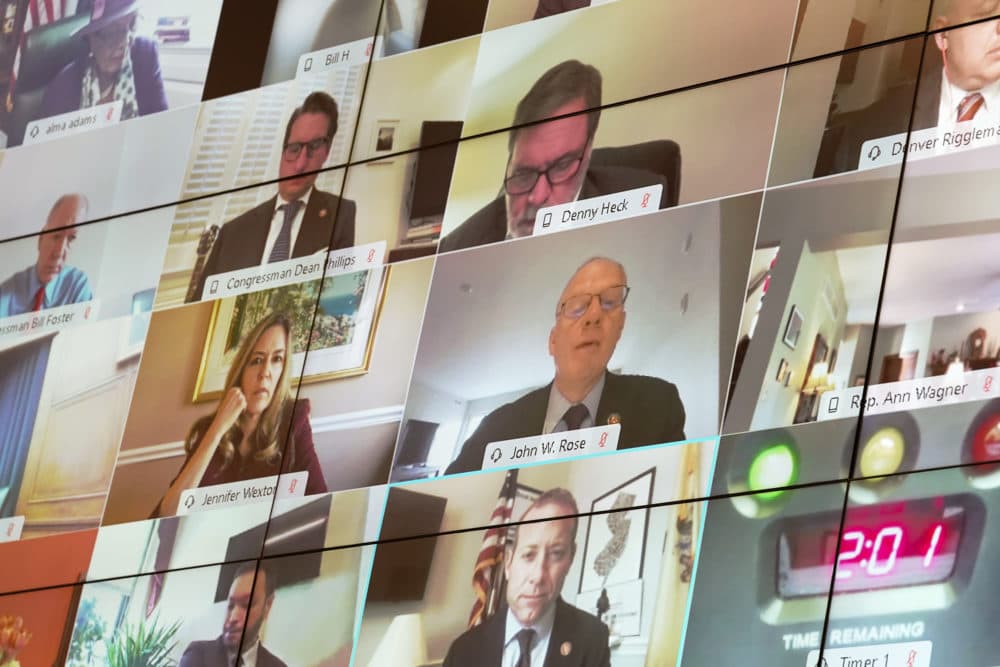Advertisement
Supporters Hope To Make Virtual Public Hearings Permanent

In pre-pandemic days, attending a public hearing typically meant setting aside a chunk of time — maybe even asking for time off work or scheduling a babysitter — and schlepping down to a city or town hall, or even the Statehouse, and waiting for a chance to speak.
When COVID-19 hit, that changed almost overnight as state and local government bodies — including the Massachusetts Legislature — abruptly began providing remote access.
Many lawmakers, activists and members of the public are hoping to avoid a full return to crowded meeting rooms by making virtual access to public hearings across the state a permanent option.
They want some of the changes allowed by an executive order Gov. Charlie Baker issued last year making changes to the state's open meeting law at the start of the pandemic written into law even after Baker lifts his pandemic state of emergency order on June 15.
In many communities, the switch to virtual access increased public participation in government by removing barriers for people with disabilities, people with limited access to transportation, and people with work and family obligations, supporters said.
“Pre-pandemic, many of the people most acutely impacted by local policy-making were left out of the process if they could not physically get to a public meeting and wait hours on end for an opportunity to testify,” Oami Amarasingham of the ACLU of Massachusetts said Wednesday during a virtual Statehouse hearing on a series of bills that would continue to allow remote public hearings.
“With remote access options the physical and temporal barriers to attending public hearings were eliminated,” she added.
Amarasingham said the ACLU supports hybrid meetings that would allow for both in-person and remote participation. The bill would also carve out an exception for public bodies that don’t currently have the technical ability to conduct remote hearings.
Advertisement
Jon Magee, a Greenfield resident and parent of a small child, said he strongly supports remote access.
“Our evenings are totally full for my family, so between dinner time and bath time and getting ready for the next day there’s just not much time to spare," Magee said at the hearing. "If I had to leave the house to participate in a public meeting that simply wouldn’t happen.”
Supporters also said continuing virtual hearings is an issue of equity, arguing that in pre-pandemic days, those with more resources could more easily set aside the time needed to attend a public hearing in person, giving them a louder voice than those without the ability to trek to a meeting in person because of work or family obligations.
While many states adopted remote access to public hearings during the pandemic, it’s unclear how many will continue that after the pandemic lifts. Besides Massachusetts, California is also weighing legislation aimed at making sure government meetings have both call-in and internet-based options for the public.
One sticking point is over the issue of whether public bodies should be allowed to conduct public hearings fully remotely or whether they should be required to hold hybrid meetings to allow both remote and in-person attendance.
Supporters of hybrid meetings say they allow citizens who may not have the needed computer skills or equipment to still attend meetings. Supporters also say hybrid meeting let citizens and members of the press approach officials in person after a hearing.
Supporters of all-virtual hearings say they allow wide public access without forcing cities and towns to return to crowded public hearing rooms or take on the expense of hybrid meetings.
Local cities and towns largely support measures to allow them to continue remote hearings, but want it to be an option, not a mandate, said Geoff Beckwith, executive director of the Massachusetts Municipal Association. Beckwith also said that many communities don’t yet have the ability to conduct hybrid meetings.
Many of those testifying also urged lawmakers to take action before the pandemic state of emergency is lifted later this month.
During the hearing no one testified to end virtual hearings completely and return solely to in-person hearings.